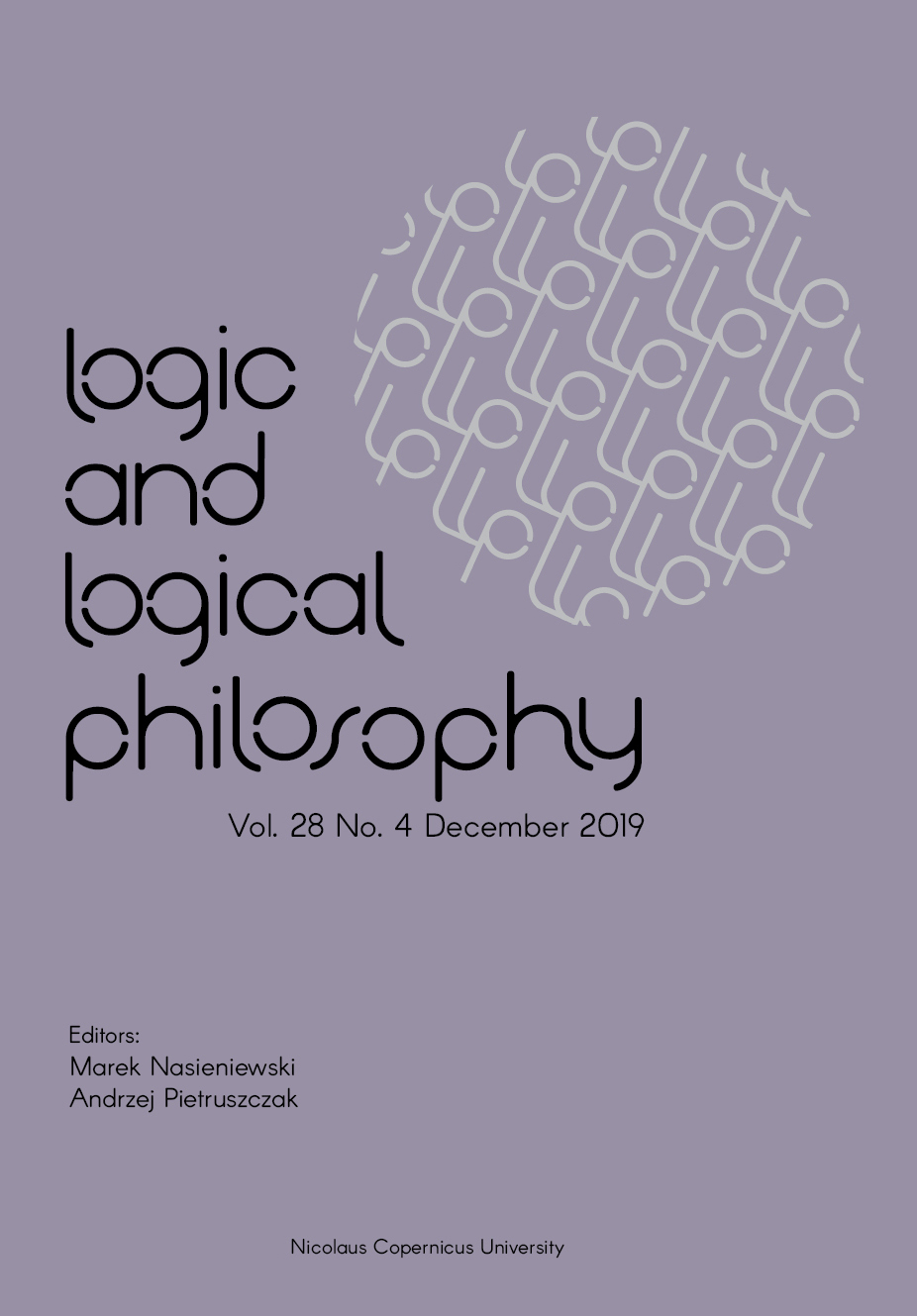On Definability of Connectives and Modal Logics over FDE
DOI:
https://doi.org/10.12775/LLP.2019.010Keywords
definability of connectives, first-degree entailment logic, modal logic, modal bilattice logic, functional completeness, translations between logics, weak definitional equivalence, definitional equivalenceAbstract
The present paper studies two approaches to the expressiveness of propositional modal logics based on first-degree entailment logic, FDE. We first consider the basic FDE-based modal logic BK and certain systems in its vicinity, and then turn to some FDE-based modal logics in a richer vocabulary, including modal bilattice logic, MBL. On the one hand, model-theoretic proofs of the definability of connectives along the lines of [McCullough, “Logical connectives for intuitionistic propositional logic”, Journal of Symbolic Logic 36, 1 (1971): 15–20. DOI: 10.2307/2271511] and [[17] Wansing, “Logical connectives for constructive modal logic”, Synthese 150, 3 (2006): 459–482. DOI: 10.1007/s11229-005-5518-5] are given for various FDE-based modal logics. On the other hand, building on [Odintsov and Wansing, “Disentangling FDE-based paraconsistent modal logics, Studia Logica 105, 6 (2017): 1221–1254. DOI: 10.1007/s11225-017-9753-9], expressibility is considered in terms of mutual faithful embeddability of one logic into another logic. A distinction is drawn between definitional equivalence, which is defined with respect to a pair of structural translations between two languages, and weak definitional equivalence, which is defined with respect to a weaker notion of translations. Moreover, the definitional equivalence of some FDE-based modal logics is proven, especially the definitional equivalence of MBL and a conservative extension of the logic BK□×BK□, which underlines the central role played by BK among FDE-based modal logics.
References
Arieli, O., and A. Avron, “Reasoning with logical bilattices”, Journal of Logic, Language and Information, 5, 1 (1996): 25–63. DOI: http://dx.doi.org/10.1007/BF00215626
Czelakowski, J., and D. Pigozzi, “Fregean logics”, Annals of Pure and Applied Logic 127, 1–3 (2004): 17–76. DOI: http://dx.doi.org/10.1016/j.apal.2003.11.008
Došen, K., and Z. Petić, “Modal functional completeness”, pages 167–211 in H. Wansing (ed.), Proof Theory of Modal Logic, Kluwer academic Publishers, Dordrecht, 1996. DOI: http://dx.doi.org/10.1007/978-94-017-2798-3_11
Font, J.M., and R. Jansana, A General Algebraic Semantics for Sentential Logics, volume 10 of Lecture Notes in Logic, Springer, Berlin, 1996. DOI: http://dx.doi.org/10.1017/9781316716915
Gyuris, V., Variations of Algebraizability, PhD thesis, The University of Illinois at Chicago, 1999.
Jung, A., and U. Rivieccio, “Priestly duality for bilattices”, Studia Logica 100, 1–2 (2012): 223–252. DOI: http://dx.doi.org/10.1007/s11225-012-9376-0
McCullough, D.P., “Logical connectives for intuitionistic propositional logic”, Journal of Symbolic Logic 36, 1 (1971): 15–20. DOI: http://dx.doi.org/10.2307/2271511
Nelson, D., “Negation and separation of concepts in constructive systems”, pages 205–225 in A. Heyting (ed.), Constructivity in Mathematics, vol. 39 of Studies in Logic and the Foundations of Mathematics, North-Nolland, Amsterdam, 1959.
Odintsov, S.P., and H. Wansing, “Modal logics with Belnapian truth values”, Journal of Applied Non-Classical Logics 20, 3 (2010): 279–301. DOI: http://dx.doi.org/10.3166/jancl.20.279-304
Odintsov, S.P., and H. Wansing, “Disentangling FDE-based paraconsistent modal logics, Studia Logica 105, 6 (2017): 1221–1254. DOI: http://dx.doi.org/10.1007/s11225-017-9753-9
Omori, H., “Generalizing functional completeness in Belnap-Dunn logic”, Studia Logica 103, 5 (2015): 883–917. DOI: http://dx.doi.org/10.1007/s11225-014-9597-5
Rivieccio, U., A. Jung and R. Jansana, “Four-valued modal logic: Kripke semantics and duality”, Journal of Logic and Computation 27, 1 (2017): 155–199. DOI: http://dx.doi.org/10.1093/logcom/exv038
Spinks, M., and R. Veroff, “Paraconsistent constructive logic with strong negation is a contraction-free relevant logic”, pages 323–379, chapter 13, in J. Czelakowski (ed.), Don Pigozzi on Abstract Algebraic Logic and Universal Algebra, Springer, Dordrecht, 2018. DOI: http://dx.doi.org/10.1007/978-3-319-74772-9_13
Vakarelov, D., “Notes on N-lattices and constructive logic with strong negation”, Studia Logica 36, 1–2 (1977): 109–125. DOI: http://dx.doi.org/10.1007/BF02121118
Wansing, H., “Functional completeness for subsystems of intuitionistic propositional logic”, Journal of Philosophical Logic 22 (1993): 303–321. DOI: http://dx.doi.org/10.1007/BF01049305
Wansing, H., “A proof-theoretic proof of functional completeness for many modal and tense logics”, pages 123–136, chapter 8, in H. Wansing (ed.), Proof Theory of Modal Logic, Kluwer Academic Publishers, Dordrecht, 1996. DOI: http://dx.doi.org/10.1007/978-94-017-2798-3_8
Wansing, H., “Logical connectives for constructive modal logic”, Synthese 150, 3 (2006): 459–482. DOI: http://dx.doi.org/10.1007/s11229-005-5518-5
Downloads
Published
How to Cite
Issue
Section
Stats
Number of views and downloads: 1291
Number of citations: 5







